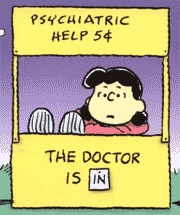 It looks like OASIS is taking biblical advice with regard to the Opendocument Format. Access for people with disabilities is ODF's potential Achilles heel, a deal-breaker for most governments who need to (and should) assure access to public records and data for employees and citizens with disabilities.
It looks like OASIS is taking biblical advice with regard to the Opendocument Format. Access for people with disabilities is ODF's potential Achilles heel, a deal-breaker for most governments who need to (and should) assure access to public records and data for employees and citizens with disabilities.The OASIS ODF Accessibility Subcommittee has just issued its accessibility assessment of the ODF 1.0 specification, available publicly here.
The report's Executive Summary lays out a roadmap for ODF to meet or exceed accessability of any file format:
The ODF Accessibility Subcommittee has identified 9 accessibility issues in ODF 1.0, and proposes candidate solutions to them. With these changes, we believe that ODF will meet or exceed the accessibility support provided in all other office file formats as well as that specified in the W3C Web Content Accessibility Guidelines 1.0.In other words, in solving any problems with ODF usability by people with disabilities, OASIS is on it.
Furthermore, these modifications will enable ODF to support the authoring of DAISY digital talking books, a worldwide standard used by blind, low vision, learning disabled, and other print impaired communities.
The recommended changes address:
* Alternative text for non-text objects (3 recommendations)
* Proper association of captions to captioned content
* Encoding of pagination information
* Preservation of table semantic structure imported from other file formats
* Proper encoding of authored table header content
* Author-defined logical navigation of page objects in presentations
* Provision of alternative text hints for hyperlinks
Furthermore, we request that the appropriate text be added to the ODF specification to indicate how this accessibility meta data is mapped by the authoring tool to a platform accessibility API as well as their accessibility applicability in the specification.
To fully address the needs of people with disabilities in using ODF, an ODF application must meet a number of accessibility requirements as well. ODF application developers should be provided with implementation guidelines to meet these requirements.






